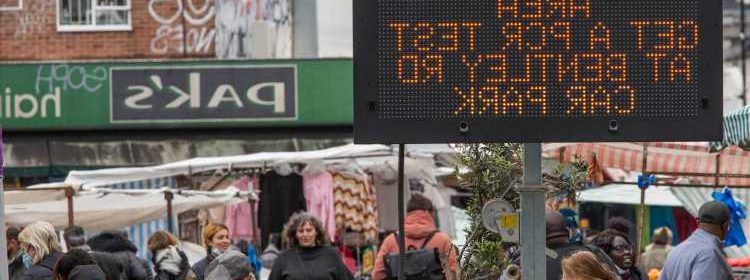UK ‘in the grips’ of third Covid wave amid fears Delta strain will infect older Brits, experts warn

THE UK is "in the grip" of a third Covid wave- as experts warn of fears the Delta strain will infect older Brits.
Cases have rapidly risen over the past few weeks, due to the fast spread of the new variant first seen in India – with the unvaccinated young bearing the brunt.
? Read our coronavirus live blog for the latest updates
Last week Health Secretary Matt Hancock revealed it now makes up 91 per cent of all UK cases.
And Sage said the R rate in the North West could be as high as 1.5, the highest in the country.
Today Professor Devi Sridhar, from the University of Edinburgh, said a third wave of cases largely in younger age groups is already happening, "but the worry is that this will slowly move, like it has in previous waves, into older groups".
She told BBC Radio 4's Today programme the goal was to "make this a manageable health issue" and use vaccines and testing to "keep the burden off health services".
She added: "We're really trying to break that chain between cases and hospitalisations and severe disease and maintain NHS capacity when burnout is already an issue within the NHS."
And former chief scientific adviser Professor Sir Mark Walport added the number of people admitted to hospital with Covid is rising, although not with the intensity seen in previous waves of the virus.
He said: "Sadly we are in the grip of the early stages of a third wave of the virus and it is this Delta variant, the so-called Indian variant, which has a very significant transmission advantage over the previous Alpha variant, the so-called Kent variant – it's about 60 per cent more transmissible.
"We've got 7,000 cases on average per day at the moment, and a doubling time which is somewhere around a week.
'BREAK THE CHAIN'
"More than 90 per cent of the new infections in the UK are of this variant, and it is rising in most parts of the country, though not all.
"The good news is we would be in real trouble if not for the enormous success of the vaccination programme and so we have got 75 per cent of all adults have had the first dose and 50 per cent who've had a second dose."
It comes as the PM is set to announce Freedom Day is being pushed back by four weeks to July 19 during a Downing St press conference at 6pm.
He'll include a break clause, meaning the lifting of restrictions could go ahead on July 5 if hospitalisations don't significantly rise.
Only five per cent of people who have caught the Delta (Indian) variant were fully vaccinated, figures show.
It further confirms jabs are working to protect people from Covid – but those unvaccinated remain at high risk.
Twelve fully vaccinated people have died of Delta, as public health experts have said the jabs are not 100 per cent effective.
The 12 fatalities were disproportionately high compared with the 23 deaths in those unvaccinated.
However, that may be because those unvaccinated are largely younger and therefore unlikely to die of Covid anyway, compared to those who are fully jabbed representing older people.
It comes as a leading professor says the Delta variant, first identified in India, seems to “working slightly differently”, with different symptoms to the classic cough and loss of smell.
However, it could be because Covid is currently causing an epidemic in young people, and symptoms are known to vary by age group.
The ZOE Covid Symptom Study has been tracking the Covid outbreak since March 2020, with millions of Brits reporting their symptoms on an app.
Prof Tim Spector, the lead on the study, told The Telegraph: “Since the start of May, we’ve been looking at the top symptoms and they are not the same as they were.
“Number one is headache followed by sore throat, runny nose and fever."
The NHS says you should get a free Covid test if you have at least one of the three main symptoms of cough, temperature and loss of taste/smell.
But doctors – including Prof Spector – have long called for the list to be expanded and therefore catch more infected people.
Prof Spector continued: “Covid is acting differently now it’s more like a cold in this younger population and people aren’t realising this, and people might think they’ve got some sort of seasonal cold and they still go out to parties and they might spread it around.”
Source: Read Full Article





